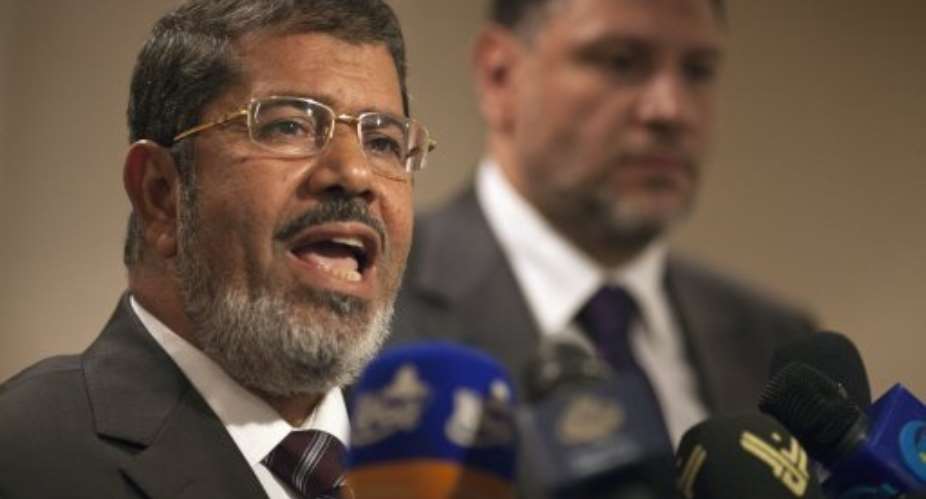CAIRO (AFP) - Egypt's landmark presidential election on Monday narrowed to a contest pitting a Muslim Brotherhood candidate against a Mubarak-era prime minister, the country's electoral commission said.
Announcing the results, commission chief Faruq Sultan said: "No candidate won an outright majority, so according to Article 40 of the presidential election law, there will be a run-off between Mohammed Mursi and Ahmed Shafiq."
The results confirmed preliminary figures announced by the Muslim Brotherhood, polarising a nation now forced to choose between a conservative Islamist and a symbol of ousted president Hosni Mubarak's regime.
Egyptians went to the polls on May 23 and 24 in the country's first free presidential election, made possible by the 2011 uprising led by pro-democracy activists.
Sultan said Mursi had won with 24.77 percent of the votes, slightly ahead of Shafiq with 23.66 percent.
Nasserist candidate Hamdeen Sabbahi came third with 20.71 percent, ahead of moderate Islamist Abdel Moneim Abul Fotouh with 17.47 percent.
Former foreign minister Amr Mussa was fifth, trailing with 11.12 percent.
The commission put the official turnout in the vote -- the first since the 2011 uprising that ousted Mubarak -- at 46 percent of the 50 million Egyptians who were eligible to cast a ballot in the historic election.
Sultan said the commission had rejected seven appeals filed by candidates on May 26 and 27, citing electoral irregularities that "did not affect the outcome of the vote."
Both Mursi and Shafiq, who represent polar opposites in the country's fragmented politics after last year's uprising, are now trying to court the support of the losing candidates and their voters.
The Brotherhood, which alienated many other political parties after its domination of parliamentary elections last winter, has warned that the nation would be in danger if Shafiq wins and has pledged to become more inclusive.
Two of the losing candidates, Mussa and Abul Fotouh, declined to endorse either of the front runners, however.
A "return to the old regime is unacceptable. So is exploiting religion in politics," Mussa told a news conference, adding that he would be willing to hold consultations with any parties if asked.
Abul Fotouh also refused to openly back a single candidate, and warned against a return to the Mubarak era.
"The most important thing is that people don't vote for a felool," he said, using a common pejorative term for members of the old regime.
The Brotherhood has gained the support of the ultra-conservative Salafist Al-Nur party, which had supported Abul Fotouh in the first round.
"The High Committee of the Al-Nur party supports Dr Mohammed Mursi for president of the republic in the run-off," the party said late on Sunday on its official Twitter account.
But a pending legal case could have serious implications for Shafiq's bid for the presidency.
Egypt's Supreme Constitutional Court is expected to rule on June 11 in a key case examining the constitutionality of a law barring senior Mubarak-era officials from running for office.
On Saturday, Mursi called a meeting of candidates that was ignored by both Sabbahi and Abul Fotouh.
He promised at a news conference after the meeting that his party would be prepared to include aspects of other parties' programmes in its platform, but fell short of reassuring critics who say the group wants to monopolise power.
"As president, I will be the president for all Egyptians. (My relationship) with the Brotherhood will be the same as all Egyptians," he said.
Shafiq also called on Saturday for broad support from former rivals, calling on his competitors by name to join him and promising there would be no return to the old regime.
"I reach out to all the partners and I pledge that we would all work together for the good of Egypt," he told reporters.
Addressing the young people who spearheaded the 2011 revolt, he said: "Your revolution has been hijacked and I am committed to bringing (it) back."
The contest presents a difficult choice for activists who led the revolt. For them, choosing Shafiq would be to admit the revolution had failed, but a vote for Mursi could threaten the very freedoms they fought for.
The presidential poll has followed a tumultuous military-led transition from autocratic rule marked by political upheaval and bloodshed, but which also witnessed free parliamentary elections.
The Supreme Council of the Armed Forces, in power since Mubarak's downfall, has pledged to restore Egypt to civilian rule by the end of June.





 We’ll no longer tolerate your empty, unwarranted attacks – TUC blasts Prof Adei
We’ll no longer tolerate your empty, unwarranted attacks – TUC blasts Prof Adei
 Bawumia donates GHc200,000 to support Madina fire victims
Bawumia donates GHc200,000 to support Madina fire victims
 IMF to disburse US$360million third tranche to Ghana without creditors MoU
IMF to disburse US$360million third tranche to Ghana without creditors MoU
 Truck owner share insights into train collision incident
Truck owner share insights into train collision incident
 Paramount chief of Bassare Traditional Area passes on
Paramount chief of Bassare Traditional Area passes on
 Two teachers in court over alleged illegal possession of BECE papers
Two teachers in court over alleged illegal possession of BECE papers
 Sunyani: Victim allegedly shot by traditional warriors appeals for justice
Sunyani: Victim allegedly shot by traditional warriors appeals for justice
 Mahama vows to scrap teacher licensure exams, review Free SHS policy
Mahama vows to scrap teacher licensure exams, review Free SHS policy
 Government will replace burnt Madina shops with a new three-story, 120-store fac...
Government will replace burnt Madina shops with a new three-story, 120-store fac...
